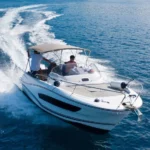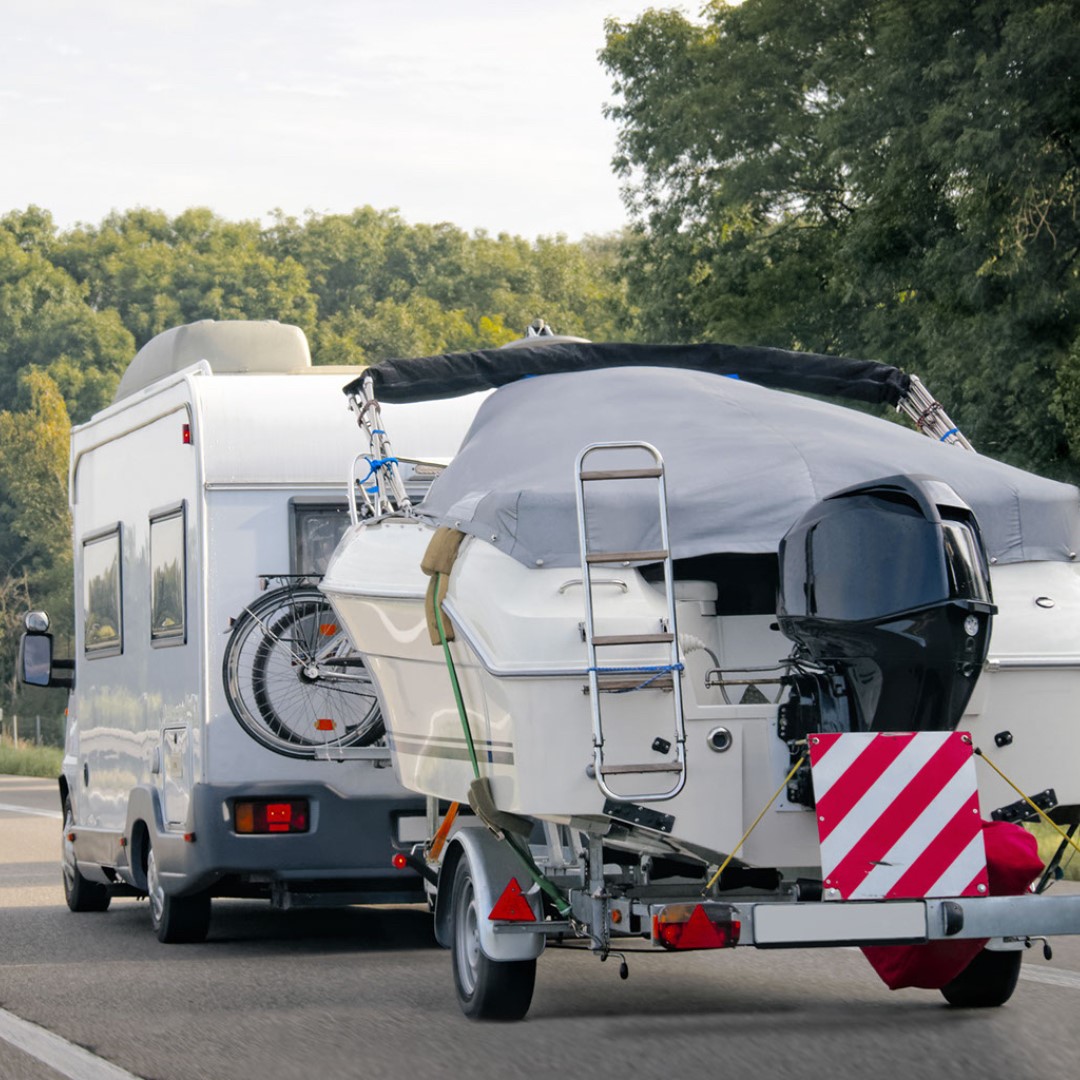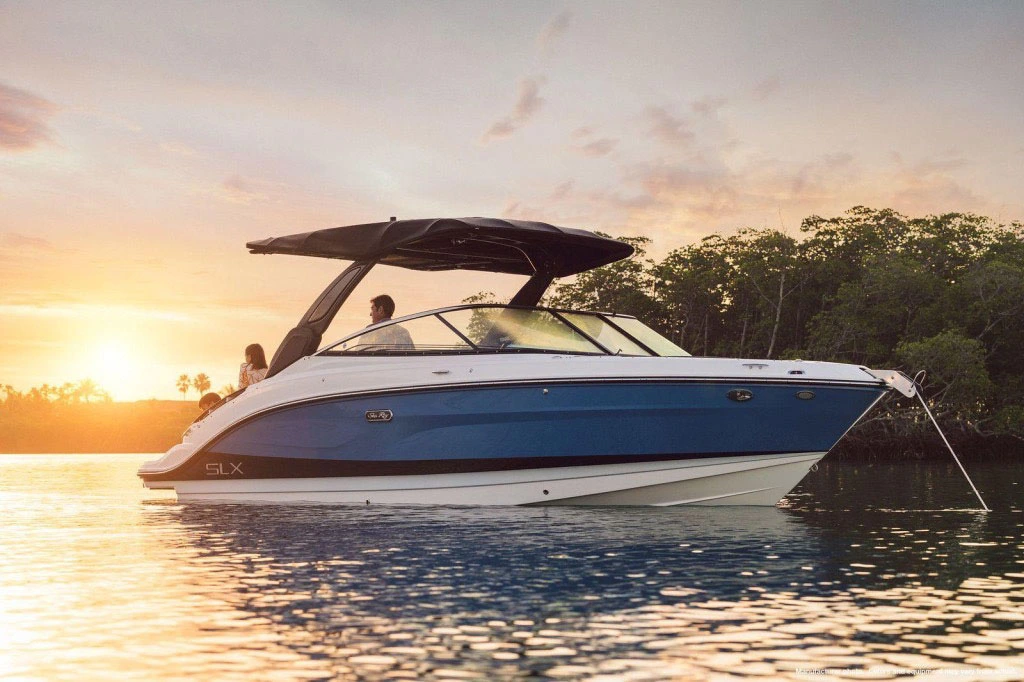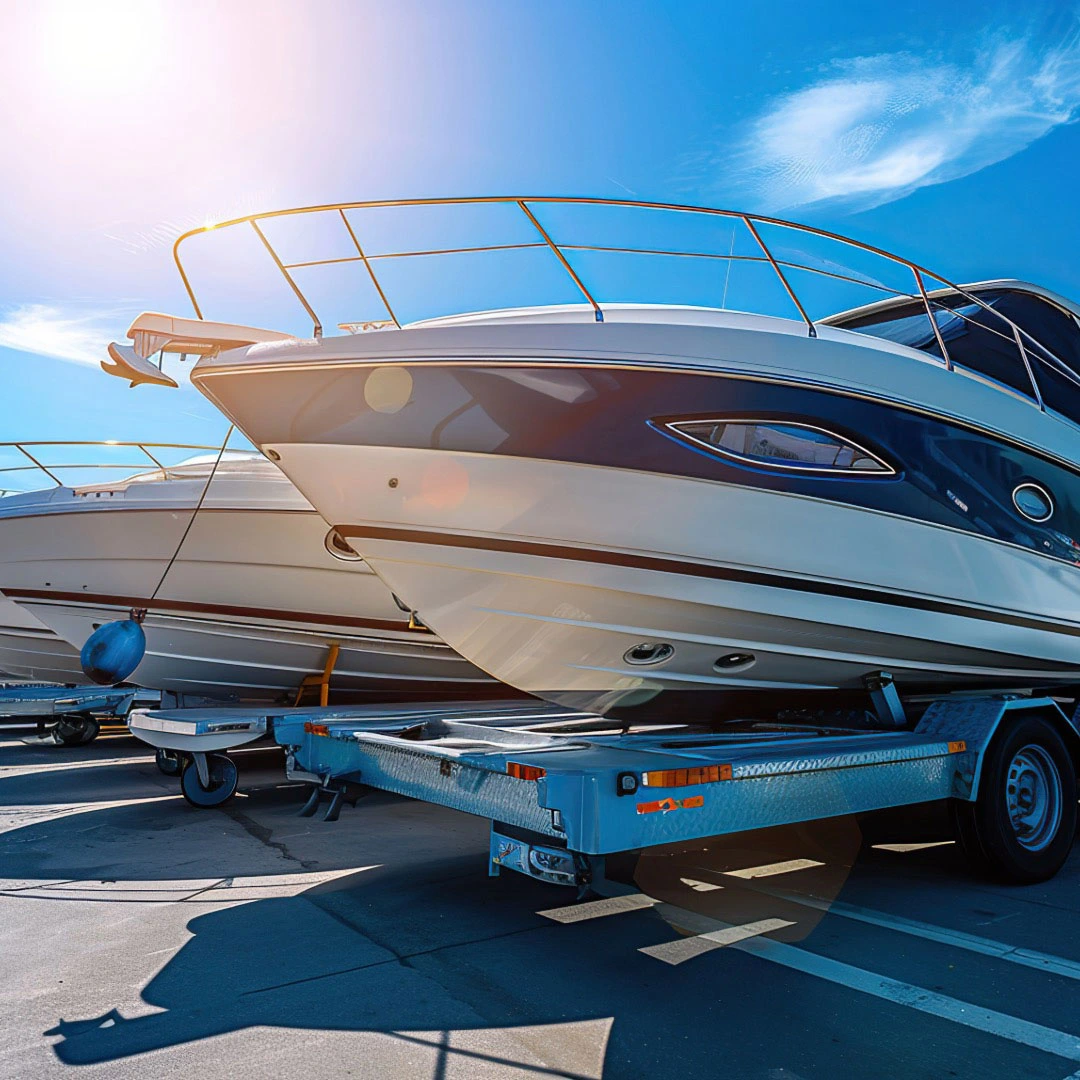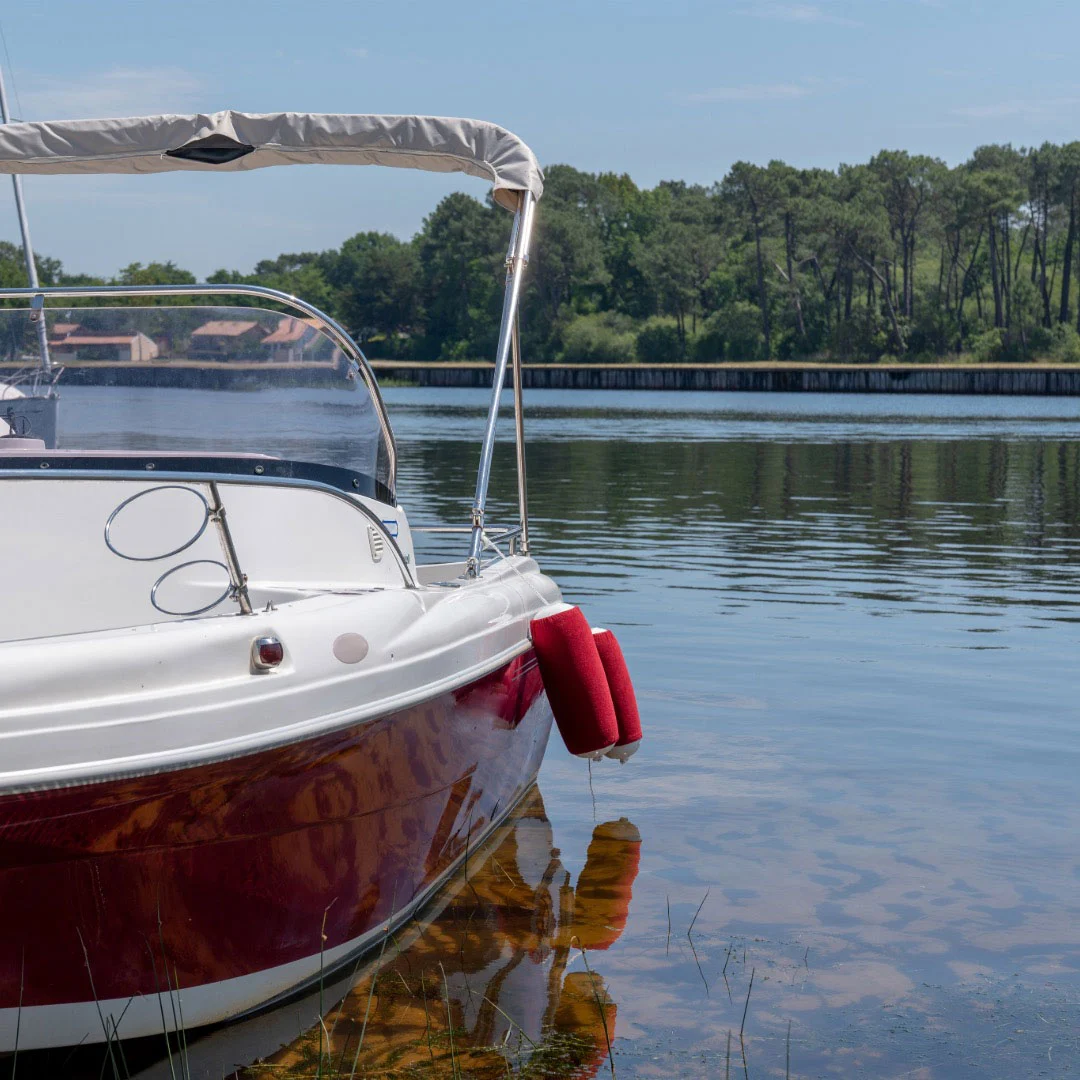Just like your car or your house, your boat needs regular maintenance throughout the year to keep it running smoothly and looking its best. Seasonal upkeep ensures your boat is prepared for different weather conditions and prevents costly repairs down the line.
Here’s a guide to keeping your boat in top shape, season after season.
Spring
- Wake Up from Winter: After winter storage, remove any covers, plugs, or dehumidifiers used for protection. Open hatches and compartments to allow fresh air circulation and prevent moisture buildup.
- Cleaning Time: Give your boat a thorough cleaning, both inside and out. Wash the hull, deck, and other surfaces with a gentle boat soap and remove any accumulated dirt, grime, or salt deposits. Saltwater, algae, and other debris can damage your boat’s finishes and equipment if left unchecked.
- Engine Prep: Change the engine oil and filter, which removes contaminants and ensures proper lubrication for the upcoming season.
- Battery Check: Inspect the battery terminals for corrosion and clean them if necessary. Ensure the battery connections are tight and check the electrolyte level (if applicable).
- Inspect hoses: Look for any loose connections or damage.
- System Checks: Test all the electrical systems, including navigation lights, bilge pumps, and bilge alarms. Ensure everything is functioning properly.
- Apply Wax: Protect your boat’s exterior before launching.
- Check sanitation system: Ensure proper positioning of Y-valves and seacocks.
- Flush thoroughly: Remove all antifreeze from the freshwater system.
- Safety First: Inspect life jackets, fire extinguishers, and other safety equipment for any damage or expiration. Replace outdated items and ensure everything is readily accessible.
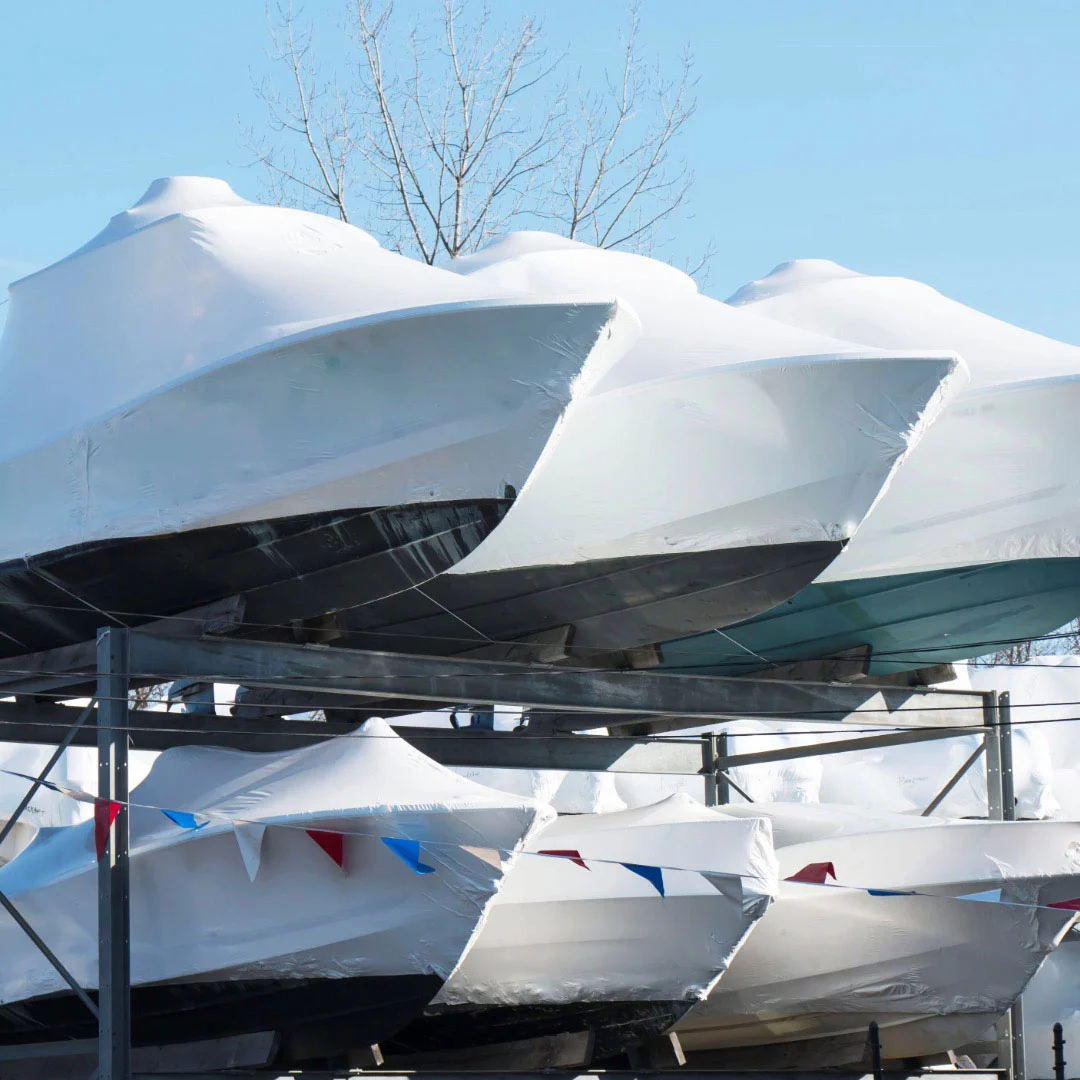
Summer
- Regular Washes: Throughout the summer, it’s recommended to wash your boat regularly, especially after saltwater use, to prevent corrosion and maintain a clean appearance.
- Engine Checks: Perform regular visual inspections of the engine for any leaks, loose hoses, or other potential issues.
- Trailer Maintenance: Inspect your boat trailer for proper tire pressure, wheel bearing lubrication, and taillight functionality.
- Shield your boat’s vinyl with a protectant. This not only keeps your boat looking clean but also provides essential UV protection throughout the sunny summer months.
8 Ways To Upgrade Your Boat Trailer
Fall
- Winterization Prep: As the season changes, begin preparing your boat for winter storage. This might involve fogging the engine, flushing the raw water system with antifreeze, and adding stabilizer to the fuel tank.
- Draining Fluids: Drain all water from the engine block, hoses, and other components to prevent freezing and potential damage during winter.
- Flush and fill the cooling system with antifreeze. This prevents freezing and potential damage to your engine block and components.
- Battery Storage: If storing the boat for an extended period, disconnect the battery and store it in a cool, dry place. Consider using a battery trickle charger to maintain its charge.
- Check the propeller for nicks, cracks, or bends. Damage can affect performance and efficiency. If the propeller shaft is in good condition, apply a coat of protective grease.This prevents rust and corrosion. If the shaft is damaged, consider replacing it. Don’t risk further damage or compromised performance.
- Cover Up: Use a proper boat cover to protect your vessel from the elements throughout the winter. Ensure the cover is secure and allows for proper ventilation to prevent moisture buildup.
A Time For Change: Do You Buy, Sell Or Upgrade?
Additional Tips
- Consult your owner’s manual: Each boat has specific maintenance requirements. Refer to your owner’s manual for detailed instructions and recommendations for your specific vessel and engine type.
- Professional help: Consider scheduling professional maintenance for complex tasks, especially if you’re unfamiliar with the process.
- Keep a logbook: Maintain a logbook to record all maintenance performed, including dates, details, and any parts replaced. This helps track your boat’s maintenance history and identify any potential issues early on.
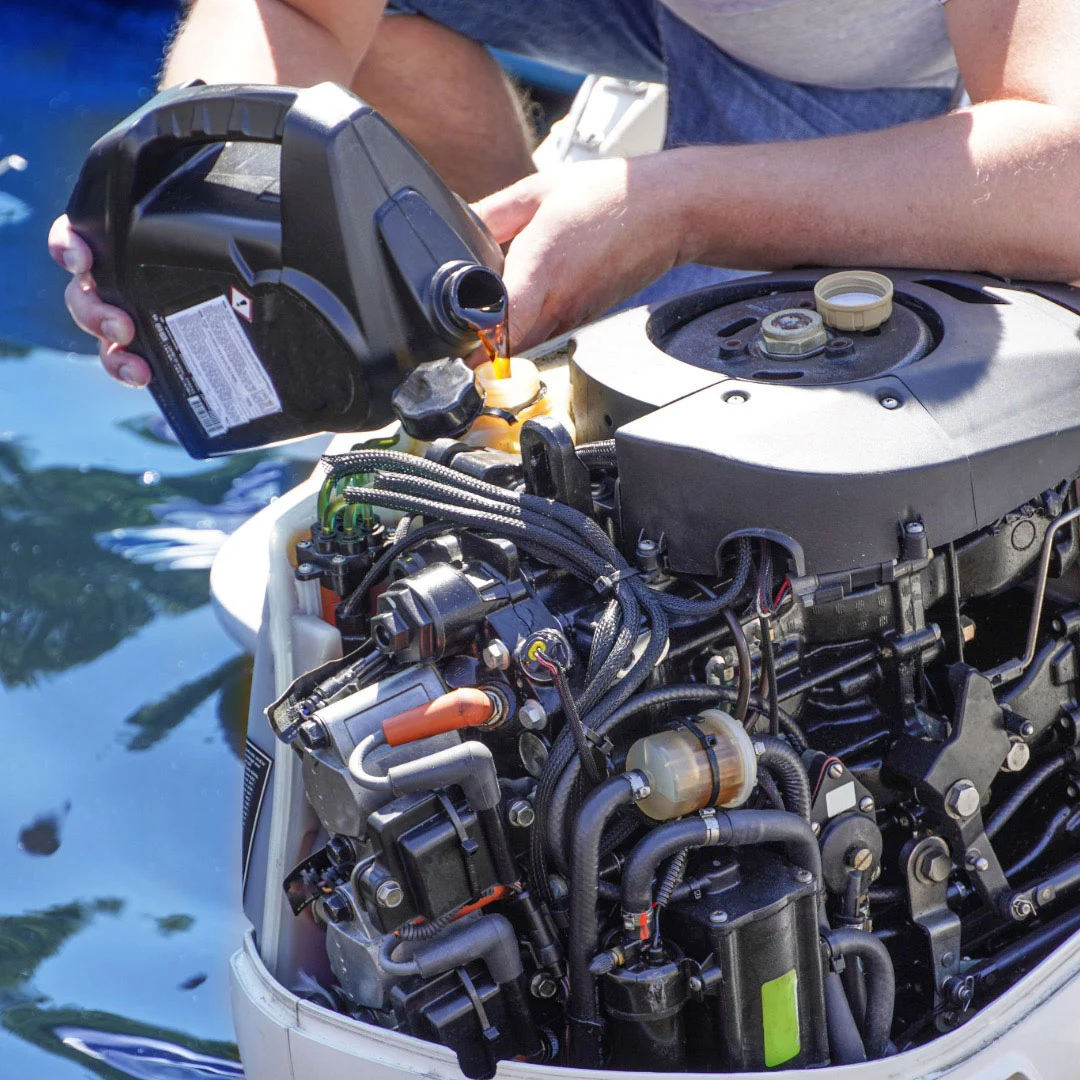
Frequently Asked Questions.
-
What should I do first after taking my boat out of storage?
Remove any covers, plugs, or dehumidifiers used for protection. Open hatches and compartments for ventilation to prevent moisture buildup.
-
What cleaning products are safe for my boat?
Use a gentle boat soap specifically designed for removing dirt, grime, and salt deposits without damaging the surface. Avoid harsh detergents or household cleaners.
-
Do I need to change the engine oil before the season starts?
Yes, changing the engine oil and filter is crucial to remove contaminants and ensure proper lubrication for the upcoming season. Refer to your owner’s manual for specific recommendations.
-
How often should I wash my boat during the summer?
Wash your boat regularly, especially after saltwater use, to prevent corrosion and maintain a clean appearance.
-
What should I check on my engine during the summer?
Perform regular visual inspections of the engine for any leaks, loose hoses, or other potential issues. Look for warning signs like unusual noises or changes in performance.
-
What trailer maintenance is essential during the summer?
Inspect your boat trailer for proper tire pressure, wheel bearing lubrication, and taillight functionality. Ensure all lights are working correctly for safe towing.
-
When should I start preparing my boat for winter storage?
Begin winterization as the season changes. This might involve fogging the engine, flushing the raw water system with antifreeze, and adding stabilizer to the fuel tank. Consult your owner’s manual for specific instructions.
-
Do I need to drain any fluids before storing my boat?
Yes, drain all water from the engine block, hoses, and other components to prevent freezing and potential damage during winter.
-
What should I do with the battery during winter storage?
Disconnect the battery and store it in a cool, dry place. Consider using a battery trickle charger to maintain its charge.
-
Where can I find detailed information on maintaining my specific boat model?
Refer to your owner’s manual for specific instructions and recommendations for your boat and engine type. It’s the most reliable source for detailed information.
-
Why is it important to perform seasonal upkeep on my boat?
Seasonal upkeep ensures your boat is prepared for different weather conditions, prevents costly repairs down the line, extends its lifespan, and ultimately keeps you safe and confident on the water.
Following these seasonal upkeep tips ensures your boat is always ready for adventure, season after season. Remember, a little TLC goes a long way. Not only will it extend your boat’s life, but it also means smoother sailing and more memorable moments on the water.
Next Read: How to Buy a Used Boat From a Private Seller
Just like your car or your house, your boat needs regular maintenance throughout the year to keep it running smoothly and looking its best. Seasonal upkeep ensures your boat is prepared for different weather conditions and prevents costly repairs down the line.
Here’s a guide to keeping your boat in top shape, season after season.
- Spring
Wake Up from Winter: After winter storage, remove any covers, plugs, or dehumidifiers used for protection. Open hatches and compartments to allow fresh air circulation and prevent moisture buildup.
Cleaning Time: Give your boat a thorough cleaning, both inside and out. Wash the hull, deck, and other surfaces with a gentle boat soap and remove any accumulated dirt, grime, or salt deposits. Saltwater, algae, and other debris can damage your boat’s finishes and equipment if left unchecked.
Engine Prep: Change the engine oil and filter, which removes contaminants and ensures proper lubrication for the upcoming season.
Battery Check: Inspect the battery terminals for corrosion and clean them if necessary. Ensure the battery connections are tight and check the electrolyte level (if applicable).
Inspect hoses: Look for any loose connections or damage.
System Checks: Test all the electrical systems, including navigation lights, bilge pumps, and bilge alarms. Ensure everything is functioning properly.
Apply Wax: Protect your boat’s exterior before launching.
Check sanitation system: Ensure proper positioning of Y-valves and seacocks.
Flush thoroughly: Remove all antifreeze from the freshwater system.
Safety First: Inspect life jackets, fire extinguishers, and other safety equipment for any damage or expiration. Replace outdated items and ensure everything is readily accessible. - Summer
Regular Washes: Throughout the summer, it’s recommended to wash your boat regularly, especially after saltwater use, to prevent corrosion and maintain a clean appearance.
Engine Checks: Perform regular visual inspections of the engine for any leaks, loose hoses, or other potential issues.
Trailer Maintenance: Inspect your boat trailer for proper tire pressure, wheel bearing lubrication, and taillight functionality.
Shield your boat’s vinyl with a protectant. This not only keeps your boat looking clean but also provides essential UV protection throughout the sunny summer months. - Fall
Winterization Prep: As the season changes, begin preparing your boat for winter storage. This might involve fogging the engine, flushing the raw water system with antifreeze, and adding stabilizer to the fuel tank.
Draining Fluids: Drain all water from the engine block, hoses, and other components to prevent freezing and potential damage during winter.
Flush and fill the cooling system with antifreeze. This prevents freezing and potential damage to your engine block and components.
Battery Storage: If storing the boat for an extended period, disconnect the battery and store it in a cool, dry place. Consider using a battery trickle charger to maintain its charge.
Check the propeller for nicks, cracks, or bends. Damage can affect performance and efficiency. If the propeller shaft is in good condition, apply a coat of protective grease.This prevents rust and corrosion. If the shaft is damaged, consider replacing it. Don’t risk further damage or compromised performance.
Cover Up: Use a proper boat cover to protect your vessel from the elements throughout the winter. Ensure the cover is secure and allows for proper ventilation to prevent moisture buildup. - Additional Tips
Consult your owner’s manual: Each boat has specific maintenance requirements. Refer to your owner’s manual for detailed instructions and recommendations for your specific vessel and engine type.
Professional help: Consider scheduling professional maintenance for complex tasks, especially if you’re unfamiliar with the process.
Keep a logbook: Maintain a logbook to record all maintenance performed, including dates, details, and any parts replaced. This helps track your boat’s maintenance history and identify any potential issues early on.
Remove any covers, plugs, or dehumidifiers used for protection. Open hatches and compartments for ventilation to prevent moisture buildup.
Use a gentle boat soap specifically designed for removing dirt, grime, and salt deposits without damaging the surface. Avoid harsh detergents or household cleaners.
Yes, changing the engine oil and filter is crucial to remove contaminants and ensure proper lubrication for the upcoming season. Refer to your owner’s manual for specific recommendations.
Wash your boat regularly, especially after saltwater use, to prevent corrosion and maintain a clean appearance.
Perform regular visual inspections of the engine for any leaks, loose hoses, or other potential issues. Look for warning signs like unusual noises or changes in performance.
Inspect your boat trailer for proper tire pressure, wheel bearing lubrication, and taillight functionality. Ensure all lights are working correctly for safe towing.
Begin winterization as the season changes. This might involve fogging the engine, flushing the raw water system with antifreeze, and adding stabilizer to the fuel tank. Consult your owner’s manual for specific instructions.
Yes, drain all water from the engine block, hoses, and other components to prevent freezing and potential damage during winter.
Disconnect the battery and store it in a cool, dry place. Consider using a battery trickle charger to maintain its charge.
Refer to your owner’s manual for specific instructions and recommendations for your boat and engine type. It’s the most reliable source for detailed information.
Seasonal upkeep ensures your boat is prepared for different weather conditions, prevents costly repairs down the line, extends its lifespan, and ultimately keeps you safe and confident on the water.


